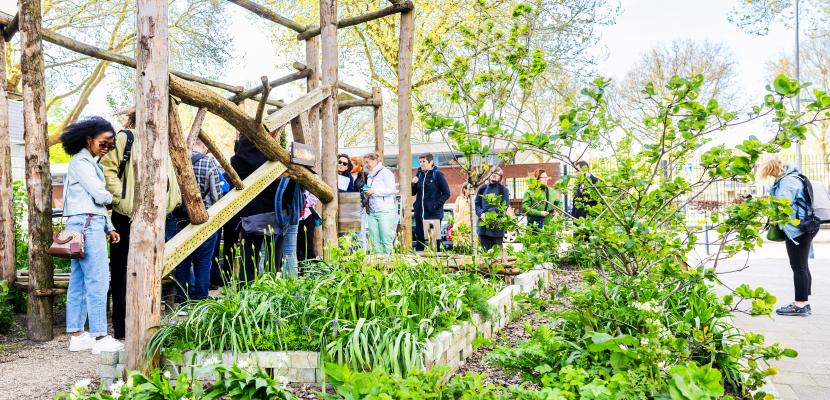
Climate Adaptive Neighbourhood Approach: Neighbourhood Garden Afrikaanderwijk

About this good practice
In 2019, the Municipality initiated a Climate Adaptive Neighbourhood Approach in areas with low participation due to socioeconomic factors (low incomes, unemployment, poverty) and physical layouts causing climate issues (lack of green, heat islands, flooding). One such neighbourhood was Afrikaanderwijk. A local representative surveyed the needs, challenges, and opportunities, forming a team of professionals and residents to start projects. The survey revealed a need for more communal green spaces, cooling areas, and edible and flowering plants. A 10-year-old resident, Aya, suggested a community garden near the community centre and local school. Residents, supported by municipal landscapers, designed the garden. A professional maintains it every four weeks with residents, aiming to teach them self-maintenance over time. The garden also serves an educational purpose, teaching school children about nature and plant maintenance. Various local organisations, including the municipality (via the Rotterdam goes for Green policy instrument), residents, community centre, schools, welfare organisations, and social enterprises, are involved in the community garden through a neighbourhood cooperation. The communal green space in the Afrikaanderwijk is part of the m2 green realized by the Rotterdam Goes for Green policy instrument.
Resources needed
Financing an external professional for a minimum of 5 years, working 1 day per week in the neighbourhood. This professional is a local resident, knows the neighourhood, knows how to connect people and organisations and knows how to work with the municipality. Plus materials to maintain the garden.
Evidence of success
Despite initial doubts by professionals, the garden thrives, maintained by residents and the local school, and supported by area organizations. It hasn’t been vandalized, as residents feel a strong connection to it and see it as their own. The space has become a place to sit and meet, rather than just walk by. Its success is further evidenced by winning the national “Steenbreek Troffee” (Breaking Stones Trophy).
Potential for learning or transfer
Greening initiatives can have a wider impact on the community. This practice can be used in areas where the physical layout causes climate and environmental issues (lack of green, heat islands, flooding due to rain), but where the residents due to socioeconomic circumstances are not able to address these issues alone. This practice shows that it is necessary to be willing to invest long term and involve local professionals. It shows that long term investment, commitment and listening to residents is essential to involve them in the approach and therefore key to its success.
Good practice owner
You can contact the good practice owner below for more detailed information.